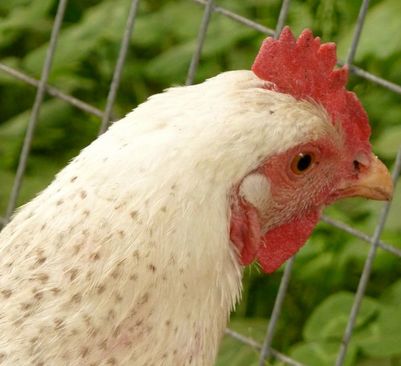
Vaccines help prevent serious disease, viruses, and illness in your flock.
Vaccines can be administered in several different ways. This article tells how to administer a vaccination to chickens by aerosol, injection, in water, in feed, topical spray or dust, and egg dipping.
Aerosol Vaccine:
Infectious Bronchitis vaccine, Newcastle Disease vaccine, and Laryngotracheitis vaccine. Day or night, house closed sufficiently to prevent cross drafts, use sprayer recommended by vaccine manufacturer, minimum spraying time 3-4 minutes, do not open the house for 15 minutes. Protect worker with goggles and face mask. Now also done in a spray cabinet at day one in hatchery for administering Newcastle-Bronchitis and Infectious Bursal Disease.
Water Administration:
Newcastle disease, Infectious Bronchitis, (or the two combined), Avian Encephalomyelitis, Infectious Bursal Disease and Infectious Laryngotracheitis vaccines. Waterer with plastic bottom or glass container best, free of sanitizer in water or container, withhold water one hour in hot weather, or longer in cold weather, vaccine in cold water, and provide enough water space so that 2/3 birds of the flock can drink at one time. Add 0.1% powdered skim milk as stabilizer. All vaccine should be consumed within 45 minutes.
Commony Used Drugs to Vaccinate Diseased Poultry
Commonly used drugs include - antibiotics, anticoccidial, antihistomonals and growth promotants
In Feed: Often used in preventive or long-term medication. Must be done when mixing feed and requires planning so that delivery and storage on the farm does not delay treatment. Requires no additional work at the farm.
In Drinking Water: Must be done at the farm and requires supervision. Compared to feed administration there is no delay in administration or withdrawal, prompt absorption and convenient to use. Birds may continue to drink when sick and "off feed".
Topical Spray or Dust: (for Ectoparasites)
Egg Dipping: Must be done at the hatchery under controlled conditions. Usually results in reduced hatchability or fertility (e.g. antibiotics to control egg transmissible diseases such as mycoplasma).
Individual Bird Injection: Expensive labor use and time consuming, but sometimes necessary in severe disease or when drug of choice is non-absorbable (e.g. antibiotics).
Note: Some drugs or antibiotics require preslaughter withdrawal time or are not permitted for use in laying birds (Jurikson, 1999).
Important: NEVER VACCINATE A SICK CHICKEN
It is advisable to have a licensed veterinarian vaccinate your birds. If you decide to vaccinate your own birds make sure you research everything before you do it.
See more About Administering Poultry Vaccines below.
Vaccines can be administered in several different ways. This article tells how to administer a vaccination to chickens by aerosol, injection, in water, in feed, topical spray or dust, and egg dipping.
Aerosol Vaccine:
Infectious Bronchitis vaccine, Newcastle Disease vaccine, and Laryngotracheitis vaccine. Day or night, house closed sufficiently to prevent cross drafts, use sprayer recommended by vaccine manufacturer, minimum spraying time 3-4 minutes, do not open the house for 15 minutes. Protect worker with goggles and face mask. Now also done in a spray cabinet at day one in hatchery for administering Newcastle-Bronchitis and Infectious Bursal Disease.
Water Administration:
Newcastle disease, Infectious Bronchitis, (or the two combined), Avian Encephalomyelitis, Infectious Bursal Disease and Infectious Laryngotracheitis vaccines. Waterer with plastic bottom or glass container best, free of sanitizer in water or container, withhold water one hour in hot weather, or longer in cold weather, vaccine in cold water, and provide enough water space so that 2/3 birds of the flock can drink at one time. Add 0.1% powdered skim milk as stabilizer. All vaccine should be consumed within 45 minutes.
Commony Used Drugs to Vaccinate Diseased Poultry
Commonly used drugs include - antibiotics, anticoccidial, antihistomonals and growth promotants
In Feed: Often used in preventive or long-term medication. Must be done when mixing feed and requires planning so that delivery and storage on the farm does not delay treatment. Requires no additional work at the farm.
In Drinking Water: Must be done at the farm and requires supervision. Compared to feed administration there is no delay in administration or withdrawal, prompt absorption and convenient to use. Birds may continue to drink when sick and "off feed".
Topical Spray or Dust: (for Ectoparasites)
Egg Dipping: Must be done at the hatchery under controlled conditions. Usually results in reduced hatchability or fertility (e.g. antibiotics to control egg transmissible diseases such as mycoplasma).
Individual Bird Injection: Expensive labor use and time consuming, but sometimes necessary in severe disease or when drug of choice is non-absorbable (e.g. antibiotics).
Note: Some drugs or antibiotics require preslaughter withdrawal time or are not permitted for use in laying birds (Jurikson, 1999).
Important: NEVER VACCINATE A SICK CHICKEN
It is advisable to have a licensed veterinarian vaccinate your birds. If you decide to vaccinate your own birds make sure you research everything before you do it.
See more About Administering Poultry Vaccines below.
References: Jurikson, Matthew (Student). Dr. Eckroade, Dr. Davison, Dr. Gingerich (Faculty). (1999) University of Pennsylvania School of Veterinary Medicine. Retrieved on Oct. 7, 2016Methods of poultry vaccination flock application. http://cal.vet.upenn.edu/projects/poultry/Syllabus/page12.htm


